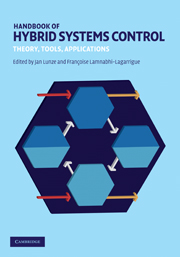13 - Energy management
from Part III - Applications
Published online by Cambridge University Press: 21 February 2011
Summary
Energy management is an issue in many applications ranging from consumer electronics to power systems. The operation of energy management systems involves many severe hybrid phenomena, mostly due to the presence of switches. As a consequence, control and optimization play a crucial role to enable increased performance and reliability, as illustrated by two examples: the control of DC-DC converters and the model-predictive supervision of the voltage stability of power networks.
Introduction to energy management
Three different categories of applications can be distinguished in the area of energy management depending on the time scale at which these systems evolve:
Power generation involves rotating machines that are used for electricity generation and for which the physical phenomena that determine the system behavior occur in the millisecond range for the magnetic part of the machine and in the range of a second for its mechanical part.
Power transmission is done through a network and the state of the system is characterized by the voltages at the nodes and active and reactive power flows between the nodes. Such a system typically evolves at time scales varying from seconds to minutes.
Power conversion involves power electronics devices for which the switching frequency is typically between kilohertz and megahertz.
The first category is not considered in this chapter, the focus will be on the last two.
- Type
- Chapter
- Information
- Handbook of Hybrid Systems ControlTheory, Tools, Applications, pp. 377 - 404Publisher: Cambridge University PressPrint publication year: 2009
- 2
- Cited by

